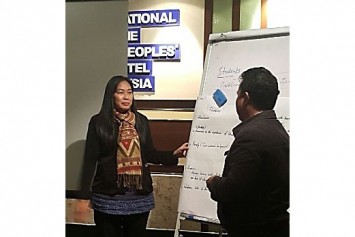Malaysia: Union underscores rights of Indigenous Peoples
Sustainable development goals will not be achieved if the rights of indigenous peoples are not respected. That was the message emerging from a meeting of teacher unionists on issues related to the rights of indigenous peoples held in Miri, Malaysia in June.

Twenty-seven participants from the Sarawak Teachers’ Union (STU), affiliated to Education International (EI), attended the workshop and discussed:
● Identifying the Sarawak’s indigenous peoples
● The United Nations’ Declaration on the Rights of Indigenous Peoples
● Challenges faced by the Sarawak’s indigenous peoples
● Ways for teachers and their unions to work with other stakeholders to overcome challenges faced by the Sarawak’s indigenous peoples
● The sustainable development goals (SDGs) pertaining to the rights of indigenous peoples
● An action plan to be implemented at school/community level
Challenges vindicated
The difficulties and exploitation experienced by the Sarawak’s indigenous peoples were highlighted by the head of the Human Rights Commission of Malaysia (Suhakam) Sarawak office, Sophian B. Osman, in a presentation on the “Rights of Indigenous Peoples in Sarawak - Challenges and Solutions”. The presentation gave authenticity and credibility to the issues they face, especially on land rights, a topic on which the Suhakam developed a report submitted to the United Nations.
“The workshop was a real eye-opener for the participants, all indigenous teachers and teacher union activists,” noted EI’s Jerome Fernandez. Many of the participants did not know that “the indigenous peoples have so many rights, guaranteed not only by UN documents, but also enshrined in the Malaysian Constitution”.
Sustainable Development Goals
He added that participants find the inclusion of the indigenous peoples’ interests in SDGs 4, 8, 13 and 16 reassuring. The presence of the STU’s top leadership at the workshop further ensured that the action plan designed during the event will be carried out by the participants, and monitored by the STU Executive Committee, he stressed.
Sarawak is the largest state in Malaysia, with a diverse population comprising many races and ethnic groups, i.e. more than 40 sub-ethnic groups, each with its own distinct language, culture and lifestyle.
Source: Education International
- 319 reads
Human Rights
Ringing FOWPAL’s Peace Bell for the World:Nobel Peace Prize Laureates’ Visions and Actions

Protecting the World’s Cultural Diversity for a Sustainable Future

The Peace Bell Resonates at the 27th Eurasian Economic Summit

Declaration of World Day of the Power of Hope Endorsed by People in 158 Nations

Puppet Show I International Friendship Day 2020

